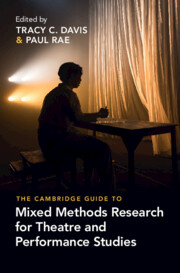Book contents
- The Cambridge Guide to Mixed Methods Research for Theatre and Performance Studies
- Reviews
- The Cambridge Guide to Mixed Methods Research for Theatre and Performance Studies
- Copyright page
- Contents
- Figures
- Tables
- Contributors
- Acknowledgements
- Introduction:
- Part I Planning
- Part II Doing
- Part III Interpreting
- Chapter 11 Methodologies Dialogue:
- Chapter 12 Non-linear Methodologies for Researching Early Modern Performance:
- Chapter 13 Taking Your Time:
- Chapter 14 Not Here for the Disciplines:
- Chapter 15 Methodologies Dialogue:
- Conclusion:
- Index
- References
Chapter 13 - Taking Your Time:
Research in Learning-Disabled Theatre
from Part III - Interpreting
Published online by Cambridge University Press: 01 February 2024
- The Cambridge Guide to Mixed Methods Research for Theatre and Performance Studies
- Reviews
- The Cambridge Guide to Mixed Methods Research for Theatre and Performance Studies
- Copyright page
- Contents
- Figures
- Tables
- Contributors
- Acknowledgements
- Introduction:
- Part I Planning
- Part II Doing
- Part III Interpreting
- Chapter 11 Methodologies Dialogue:
- Chapter 12 Non-linear Methodologies for Researching Early Modern Performance:
- Chapter 13 Taking Your Time:
- Chapter 14 Not Here for the Disciplines:
- Chapter 15 Methodologies Dialogue:
- Conclusion:
- Index
- References
Summary
This chapter examines how the research methodology of learning-disabled theatre requires a different consideration of temporality. Tony McCaffrey draws on eighteen years’ work with Different Light Theatre in Christchurch, New Zealand to show how epistemic inequity between non-disabled and disabled participants inflects the outcome-led temporality of ‘inclusion’. He articulates that shifts need to occur from the rush to emulate non-disabled performance towards more speculative practice. The research methods of this practice encompass a more elastic notion of time, allowing for non-verbal, dysfluent rhetoric and a non-linear chronology of development in order to admit the possibility of learning from learning-disabled artists.
- Type
- Chapter
- Information
- Publisher: Cambridge University PressPrint publication year: 2024
References
- 1
- Cited by

